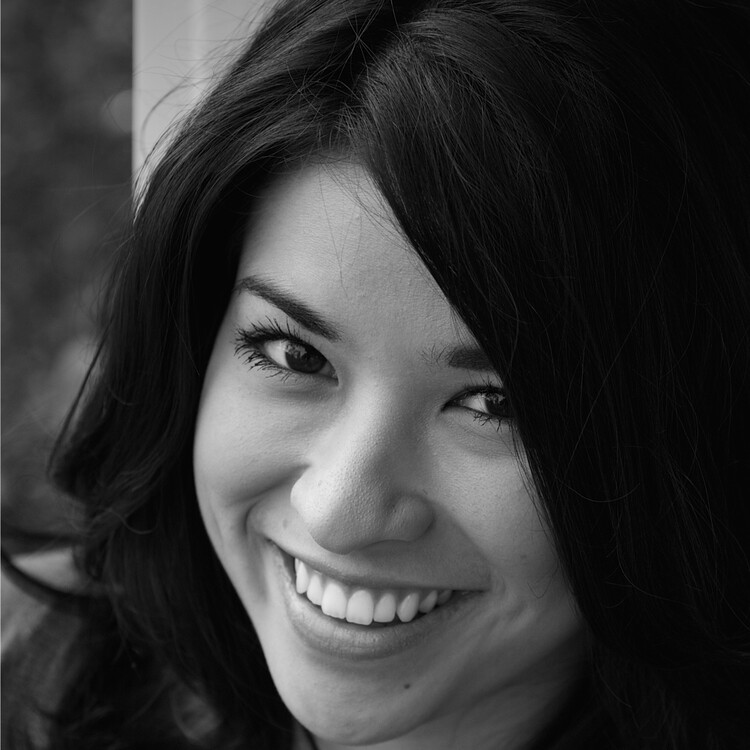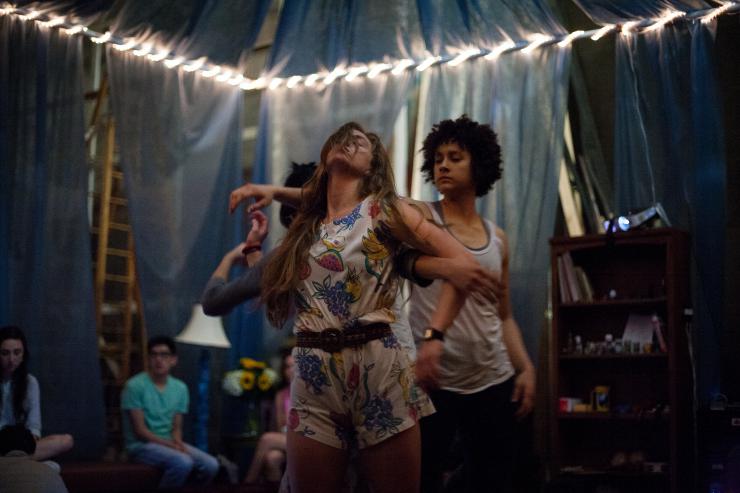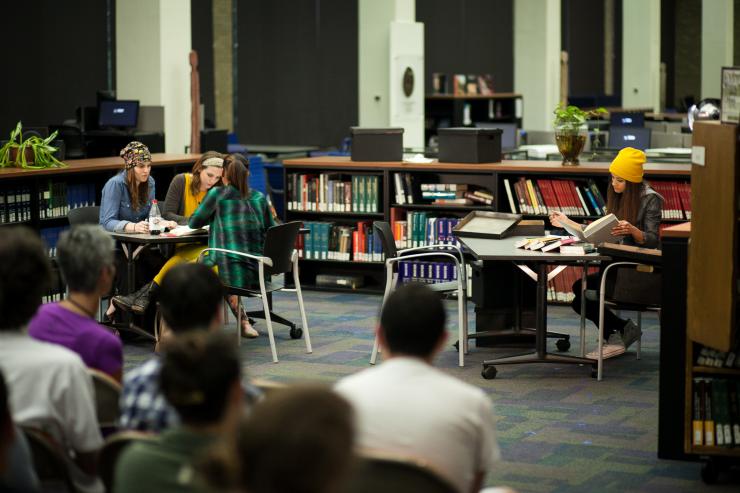The Cohen New Works Festival and Beyond
This is the third of three posts about The Cohen New Works Festival, the largest collegiate festival of new work in the nation, hosted by The University of Texas at Austin. Two students will outline the development and foundation of the festival, capture happenings during the week, and discuss what the American theatre can expect as a result.
After five whirlwind days of non-stop theatre, dance, and artistry the 2015 Cohen New Works Festival has come to an end. But even if the event itself is over, the work certainly isn’t. The Women of Juarez by Isaac Gomez, featured in the 2013 cycle, continues to have workshops in Chicago, and has found its way onto a theatre and dance syllabus this past fall at UT, furthering the practice of infusing new work into the classroom. Additionally, the project lead of The Way You Move Your Body, Lucy Kerr, went on to win the George Mitchell award—the highest honor for an undergraduate student at UT Austin—for her thesis that used applied modern dance to change perceptions of people who are disabled. Just as these projects have not seen their final showings, the lessons and revelations from this festival will continue for years to come.
So what are we left with after thirty-seven projects in five days? A complicated mix of emotions and questions about the UT Theatre and Dance department and the world beyond. After attending the Art as Activism Salon, the project lead for TwentyEight, Tyler English-Beckwith, spoke about African American representation and the upsetting lack of it on the stages of UT. I couldn’t help but extend that topic further into the surrounding community; Austin has a Black population of 8 percent that is steadily declining. How would increasing the amount of Black representation on UT stages impact not merely the UT student body, but its surrounding community? Another question: after seeing Mad & a Goat, I considered my own student debt in relation to the rest of the nation, a whopping average of $33,000 per student as of 2014. A majority of students have an intimate awareness of this issue, but when does awareness change to action? And yet another question: in the post-show discussion for No More, project lead Morganne Mazeika spoke about domestic violence in lieu of recent media coverage such as the incident with Ray Rice and his wife, leading me to think about consequences. What does a possible “second chance” look like for Ray Rice, and when does forgiveness beget forgetting?
We knew the festival would beat us when many of us felt the crushing weight of disappointment in the application and audition process. We knew the festival would beat us when there weren’t enough stage managers to go around. We knew the festival would beat us when projects got four hours of tech rehearsal and there was no way that would be enough time. But what we discovered was that the festival would save us.
The festival performances brought a female presence to the stage reflective of the amount of women in the department. At the auditions for the fall 2014 shows, 157 women auditioned for thirty-one available female roles, while sixty-five men auditioned for twenty-eight available male roles. That means only 19 percent of the women who auditioned ended up on stage, while 43 percent of the men did. Will the UT Theatre and Dance department notice and thoughtfully consider the amount of women represented on stage in the festival when trying to decide on plays for the next season? Though these projects may not have initially intended to bring attention to gender disparity in performance, the statements made on stage will remain topics of discussion as we move forward into future seasons. Change starts with an opportunity like the Cohen New Works Festival, when artists, patrons, and faculty leave with a sense of urgency to find answers to tough, worthwhile questions. Not only will these critical conversations continue in our department, they will continue across the American theatre.
The experience of the 2015 Cohen New Works Festival cannot be summed up in words, but in moments that shaped us as artists, scholars, and individuals. We knew the festival would beat us when many of us felt the crushing weight of disappointment in the application and audition process. We knew the festival would beat us when there weren’t enough stage managers to go around. We knew the festival would beat us when projects got four hours of tech rehearsal and there was no way that would be enough time.
But what we discovered was that the festival would save us.
We knew the festival would save us when fifteen members from Emanation showed up for Winship transformation, even though their performance was in another building. We knew that the festival would save us when we saw six Black students on stage for the first time in at least four years in TwentyEight. We knew that the festival would save us when student producer Tamara Carroll reminded us that when we feel gratitude, we cannot simultaneously experience fear.
My greatest wish is that we as a student body and as a department will move through the next two years grateful for the things we learned as a community, and that we will not be afraid to take artistic risks; that we will openly embrace the ethnic diversity of our department, and confront gender disparity in our season head-on.
We extend our infinite thanks to Suzan Zeder and her unending support of new student work, our faculty who are there during our successes and failures, and especially our peers: those in the past for demonstrating artistic courage, those in the present for challenging the status quo, and those in the future who will carry this torch even farther.
***
Photos by Lawrence Peart.



















Comments
The article is just the start of the conversation—we want to know what you think about this subject, too! HowlRound is a space for knowledge-sharing, and we welcome spirited, thoughtful, and on-topic dialogue. Find our full comments policy here
Thank you. I hope this can turn into fruitful conversation across the department and beyond.